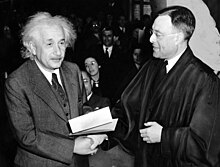
Back قانون الجنسية الأمريكية Arabic ABŞ vətəndaşlıq qanunu Azerbaijani قانون تابعیت ایالات متحده آمریکا Persian Yhdysvaltain kansalaisuus Finnish Гражданство США Russian Amerikanskt medborgarskap Swedish 美國國籍法 ZH-YUE
| United States citizenship and immigration |
|---|
| Immigration |
| Citizenship |
| Agencies |
| Legislation |
| History |
| Relevant legislation |
|
|

United States nationality law details the conditions in which a person holds United States nationality. In the United States, nationality is typically obtained through provisions in the U.S. Constitution, various laws, and international agreements. Citizenship is established as a right under the Constitution, not as a privilege, for those born in the United States under its jurisdiction and those who have been "naturalized".[2] While the words citizen and national are sometimes used interchangeably, national is a broader legal term, such that a person can be a national but not a citizen, while citizen is reserved to nationals who have the status of citizenship.
Individuals born in any of the 50 U.S. states, the District of Columbia or almost any inhabited territory are United States citizens (and nationals) by birthright. The sole exception is American Samoa, where individuals are typically non-citizen U.S. nationals at birth. Additionally, individuals born from foreign diplomats working in the United States are neither citizens nor nationals. Foreign nationals living in any state or qualified territory may naturalize after going through the legal process of qualifying as permanent residents and meeting a residence requirement (normally five years).
- ^ Laskow 2017.
- ^ The 14th Amendment to the U.S. Constitution states: "All persons born or naturalized in the United States, and subject to the jurisdiction thereof, are citizens of the United States and of the State wherein they reside".